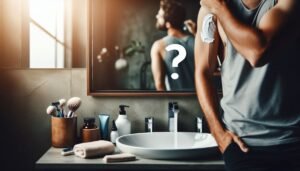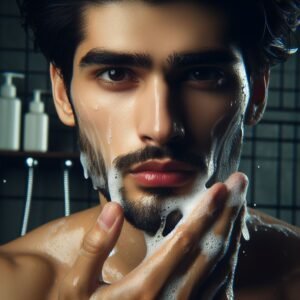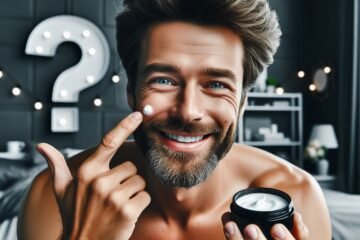
How To Prevent Pimples: 15 Best Tips To Remove Pimples For Men
Pimples can be a frustrating issue for many men whether you’re dealing with occasional breakouts or persistent acne, it’s important to understand how to prevent them. By developing the right habits, you can significantly reduce their occurrence by maintaining clear, healthy skin. Here are some of the best tips to keep your skin blemish-free.
In this blog post, we’ll explore whether you want to know how to prevent pimples, how to reduce pimples, or how to remove pimples from the face…
1. Keep Your Face Clean

Maintaining clean skin is the first step in preventing pimples. Wash your face twice a day using a mild cleanser designed for your skin type. This helps to remove dirt, excess oil, and impurities that clog pores and lead to acne. Overwashing or using harsh soaps can irritate the skin and worsen acne, so it’s crucial to strike the right balance. Additionally, always ensure your hands are clean before touching your face to avoid transferring bacteria that can trigger breakouts.
Regularly cleansing your face also prevents the buildup of dead skin cells that can block pores and form pimples. After a workout or a day spent in polluted environments, an extra wash might be necessary to ensure your skin remains free of contaminants. Using lukewarm water instead of hot water is recommended, as hot water can strip your skin of its natural oils, leading to dryness and irritation, which may exacerbate acne.
2. Exfoliate Face Regularly

Exfoliating your face helps to remove the dead skin cells that accumulate on the surface of your skin, which can clog pores and contribute to pimple formation. Regular exfoliation, about two to three times a week, keeps your skin smooth and reduces the likelihood of breakouts. Use a gentle exfoliant suited for your skin type to avoid irritation and over-exfoliation, which can damage the skin barrier and lead to increased oil production.
Incorporating exfoliation into your skincare routine can also enhance the effectiveness of other products, as it allows for better penetration of moisturizers, serums, and acne treatments. Opt for chemical exfoliants like salicylic acid, which is particularly effective for acne-prone skin, as it helps to unclog pores and reduce inflammation. Physical exfoliants can also be used but should be applied with care to avoid micro-tears in the skin.
3. Moisturize Face Daily

Moisturizing daily is essential for all skin types, including oily and acne-prone skin. A good moisturizer helps to maintain the skin’s hydration balance, preventing the overproduction of oil that can lead to pimples. Choose a lightweight, non-comedogenic moisturizer that won’t clog your pores but will provide sufficient hydration. Moisturizing also soothes the skin and aids in the repair of the skin barrier, which can be compromised by acne treatments or environmental factors.
In addition to preventing excess oil production, regular moisturizing can help reduce the appearance of acne scars and redness associated with pimples. For men who shave, moisturizing after shaving can prevent irritation and razor bumps, which can also contribute to breakouts. Look for products with added benefits, such as SPF protection or ingredients like hyaluronic acid, which provides deep hydration without leaving a greasy residue.
4. Shave Beard Properly

Shaving can be a trigger for pimples if not done correctly. To prevent breakouts, use a clean, sharp razor and shave in the direction of hair growth to avoid irritation and ingrown hairs, which can lead to pimples. Pre-shave preparation is also crucial soften your beard with warm water and use a shaving cream or gel that provides a smooth glide. This reduces friction and minimizes the risk of cuts or abrasions, which can become infected and cause pimples.
Post-shave care is just as important. Rinse your face with cool water to close pores and apply an alcohol-free aftershave or a soothing moisturizer to calm the skin and prevent irritation. Avoid sharing razors, as this can spread bacteria and increase the risk of acne. Regularly replace your razor blades, as dull blades can tug at the skin, causing micro-injuries that are prone to infection and pimple formation.
5. Keep Your Hair Clean

Keeping your hair clean is essential in preventing pimples, especially along the hairline and forehead. Hair products like gels, oils, and pomades can transfer to your skin and clog pores, leading to breakouts. Regularly shampooing your hair removes excess oil, dirt, and product buildup that could otherwise contribute to skin issues. For men with longer hair, ensure it’s kept away from the face to minimize contact with the skin.
If you use styling products, opt for those labeled non-comedogenic or designed for acne-prone skin. Additionally, be mindful of how often you touch your hair and then your face, as this can transfer oils and bacteria to your skin, increasing the likelihood of pimples. Keeping your hair clean and maintaining a good hair care routine plays a significant role in overall skin health.
6. Maintain A Balanced Diet

Your diet significantly impacts the health of your skin. A balanced diet rich in fruits, vegetables, whole grains, and lean proteins can help prevent pimples by providing essential nutrients that support skin health. Avoid excessive consumption of sugary, greasy, and processed foods, as they can trigger inflammation and increase the likelihood of acne. Foods high in antioxidants, such as berries and leafy greens, can help reduce skin inflammation and prevent breakouts.
In addition to a nutrient-rich diet, it’s essential to maintain a steady intake of omega-3 fatty acids found in fish, nuts, and seeds, which have anti-inflammatory properties that can help prevent pimples. Consider reducing your intake of dairy products, as some studies suggest a link between dairy and increased acne breakouts. Keeping a food diary can also help you identify specific foods that may trigger your acne and allow you to adjust your diet accordingly.
7. Always Stay Hydrated

Staying hydrated is crucial for maintaining healthy skin and preventing pimples. Drinking enough water helps to flush toxins from your body and keeps your skin hydrated, reducing the likelihood of oil buildup and clogged pores. Proper hydration also supports the skin’s elasticity and natural barrier function, helping to protect against environmental factors that can cause breakouts.
Aim to drink at least 8 glasses of water a day, and consider increasing your intake if you’re active or in hot climates where you may lose more water through sweat. In addition to drinking water, incorporating hydrating foods like cucumbers, oranges, and watermelon into your diet can further support your skin’s hydration levels. Staying well-hydrated ensures that your skin remains clear, supple, and less prone to pimples.
8. Avoid Smoking Habits

Smoking can have a detrimental effect on your skin, contributing to pimples and other skin problems. The toxins in cigarette smoke can damage your skin’s elasticity, reduce blood flow, and impair the skin’s ability to heal, leading to clogged pores and breakouts. Additionally, smoking increases oxidative stress on the skin, which can exacerbate acne and lead to premature aging.
Quitting smoking or reducing your intake can significantly improve your skin’s health and reduce the occurrence of pimples. It also helps to avoid environments with secondhand smoke, as this can also negatively impact your skin. Over time, as your body detoxifies from the effects of smoking, you’ll notice a clearer complexion and a reduction in acne-related issues.
9. Follow Good Skincare Routine

Establishing and maintaining a good skincare routine is key to preventing pimples. Your routine should include cleansing, toning, moisturizing, and applying sunscreen daily. Tailor your skincare products to your skin type, whether it’s oily, dry, or combination, to address specific concerns effectively. Consistency is crucial; follow your routine morning and night to keep your skin balanced and healthy.
In addition to the basics, consider incorporating treatments like spot treatments for pimples or serums containing active ingredients such as salicylic acid or benzoyl peroxide to target acne directly. Regularly evaluate your skincare routine and adjust it according to changes in your skin’s condition, such as during different seasons or as you age. A well-rounded skincare routine not only prevents pimples but also enhances your skin’s overall health and appearance.
10. Manage Stress Effectively

Stress is a known trigger for acne, as it can lead to hormonal imbalances that increase oil production and inflammation in the skin. Learning to manage stress effectively is therefore essential in preventing pimples. Incorporate stress-reducing activities into your daily routine, such as exercise, meditation, deep breathing exercises, or hobbies that help you unwind. Regular physical activity, in particular, boosts circulation, which can promote healthy skin.
In addition to physical methods of stress management, ensuring adequate sleep and maintaining a balanced lifestyle also play a significant role in reducing stress-related acne. Aim for at least 7-8 hours of sleep per night to allow your skin and body to recover from daily stressors. By managing stress, you not only improve your mental well-being but also contribute to clearer, healthier skin.
11. Avoid Touching Your Face

Frequently touching your face can transfer oils, dirt, and bacteria from your hands to your skin, leading to clogged pores and pimples. To reduce the risk of breakouts, make a conscious effort to avoid touching your face throughout the day. This includes habits like resting your face in your hands, picking at pimples, or rubbing your eyes. If you need to touch your face, such as when applying skincare products, always wash your hands first.
In addition to avoiding direct contact, be mindful of objects that frequently come into contact with your face, such as your phone, sunglasses, or pillowcases. Keep these items clean to minimize the transfer of bacteria and oil to your skin. Breaking the habit of touching your face can be challenging, but it’s a simple and effective way to prevent pimples.
12. Use Right Skincare Products

Choosing the right skincare products for your skin type is critical in preventing pimples. Use products that are specifically designed for your skin type, whether it’s oily, dry, sensitive, or a combination. Avoid products that contain harsh chemicals or fragrances, as these can irritate the skin and lead to breakouts. Look for non-comedogenic products, which are less likely to clog pores and cause pimples.
When selecting skincare products, consider incorporating those that contain active ingredients known to fight acne, such as salicylic acid, benzoyl peroxide, or tea tree oil. These ingredients help to unclog pores, reduce inflammation, and kill acne-causing bacteria. It’s also important to patch-test new products before applying them to your entire face to ensure they don’t cause irritation or allergic reactions.
13. Use Non-Comedogenic Products

Non-comedogenic products are specifically formulated to not clog pores, making them ideal for preventing pimples. When choosing skincare and cosmetic products, always look for the non-comedogenic label to ensure they won’t contribute to breakouts. This includes everything from moisturizers and sunscreens to makeup and hair care products. Using non-comedogenic products helps maintain clear pores and reduces the risk of developing pimples.
In addition to skincare, be mindful of the ingredients in your hair care products, as oils and silicones can transfer to your skin and cause pimples along the hairline. If you have oily or acne-prone skin, non-comedogenic products should be a staple in your routine to keep your skin clear and healthy. This small adjustment in your product selection can make a significant difference in your skin’s appearance.
14. Protect Your Skin From The Sun

Sun protection is vital for preventing pimples and maintaining overall skin health. While moderate sun exposure can sometimes improve acne, too much can worsen it by causing inflammation, dryness, and increased oil production. Always apply a broad-spectrum sunscreen with at least SPF 30 before going outside, even on cloudy days, to protect your skin from harmful UV rays. Choose a non-comedogenic sunscreen to avoid clogging pores.
In addition to sunscreen, wear protective clothing and seek shade whenever possible, especially during peak sun hours. Sun exposure can also darken acne scars and hyperpigmentation, making them more noticeable. By protecting your skin from the sun, you not only prevent pimples but also reduce the risk of long-term damage, such as premature aging and skin cancer.
15. Keep Clean Pillowcases And Towels

Clean pillowcases and towels play a crucial role in preventing pimples. Pillowcases and towels can accumulate oil, dirt, and bacteria over time, which can transfer to your skin and cause breakouts. To minimize this risk, change your pillowcase at least once a week and use a fresh towel each time you wash your face. If you have oily or acne-prone skin, you might benefit from changing your pillowcase even more frequently.
In addition to cleanliness, consider the type of fabric your pillowcase is made from. Opt for soft, breathable materials like cotton, which are less likely to irritate the skin and cause pimples. By maintaining clean bedding and towels, you create a healthier environment for your skin, reducing the likelihood of pimples and promoting overall skin health.
16. Summary

In summary, Preventing pimples involves a combination of good hygiene, skincare, and healthy lifestyle habits. Key steps include keeping your face clean, exfoliating regularly, and moisturizing daily to maintain a balanced skin barrier. Proper shaving techniques, maintaining clean hair, and using non-comedogenic products also help reduce the risk of breakouts. A balanced diet, staying hydrated, and managing stress effectively contribute to clearer skin from the inside out. Additionally, protecting your skin from the sun, avoiding smoking, and keeping clean pillowcases and towels are crucial in minimizing pimple formation and promoting overall skin health.
Simple Comprehension Table
| Tip | Summary |
|---|---|
| 1. Keep Your Face Clean | Wash your face twice daily with a mild cleanser to remove dirt and prevent clogged pores. |
| 2. Exfoliate Face Regularly | Exfoliate 2-3 times a week to remove dead skin cells and reduce pimple formation. |
| 3. Moisturize Face Daily | Use a non-comedogenic moisturizer daily to maintain hydration and prevent excess oil production. |
| 4. Shave Beard Properly | Shave with a clean, sharp razor in the direction of hair growth to avoid irritation and ingrown hairs. |
| 5. Keep Your Hair Clean | Regularly shampoo hair to prevent product buildup and oil transfer to the skin. |
| 6. Maintain A Balanced Diet | Eat a diet rich in fruits, vegetables, and lean proteins to support skin health. |
| 7. Always Stay Hydrated | Drink at least 8 glasses of water daily to keep skin hydrated and flush out toxins. |
| 8. Avoid Smoking Habits | Reduce or quit smoking to prevent skin damage and pimple formation. |
| 9. Follow Good Skincare Routine | Maintain a consistent skincare routine with cleansing, moisturizing, and sun protection. |
| 10. Manage Stress Effectively | Practice stress-reducing activities like exercise and meditation to prevent stress-induced acne. |
| 11. Avoid Touching Your Face | Minimize face-touching to avoid transferring bacteria and oils that can cause pimples. |
| 12. Use Right Skincare Products | Choose skincare products suitable for your skin type to prevent irritation and breakouts. |
| 13. Use Non-Comedogenic Products | Select non-comedogenic products to avoid clogging pores and developing pimples. |
| 14. Protect Your Skin from the Sun | Use SPF 30 sunscreen daily and wear protective clothing to prevent sun-related skin issues. |
| 15. Keep Clean Pillowcases and Towels | Change pillowcases and towels regularly to prevent bacteria buildup that can cause pimples. |
So You have gotten all the answers about how to prevent pimples, how to reduce pimples, or how to remove pimples from the face
Like This Also Read- Skincare Mistakes: 10 Worst Skincare Mistakes Men Make









